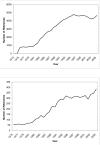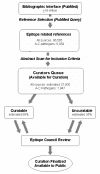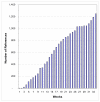Curation of complex, context-dependent immunological data
- PMID: 16836764
- PMCID: PMC1534061
- DOI: 10.1186/1471-2105-7-341
Curation of complex, context-dependent immunological data
Abstract
Background: The Immune Epitope Database and Analysis Resource (IEDB) is dedicated to capturing, housing and analyzing complex immune epitope related data http://www.immuneepitope.org.
Description: To identify and extract relevant data from the scientific literature in an efficient and accurate manner, novel processes were developed for manual and semi-automated annotation.
Conclusion: Formalized curation strategies enable the processing of a large volume of context-dependent data, which are now available to the scientific community in an accessible and transparent format. The experiences described herein are applicable to other databases housing complex biological data and requiring a high level of curation expertise.
Figures




Similar articles
-
The immune epitope database 2.0.Nucleic Acids Res. 2010 Jan;38(Database issue):D854-62. doi: 10.1093/nar/gkp1004. Epub 2009 Nov 11. Nucleic Acids Res. 2010. PMID: 19906713 Free PMC article.
-
An evaluation of GO annotation retrieval for BioCreAtIvE and GOA.BMC Bioinformatics. 2005;6 Suppl 1(Suppl 1):S17. doi: 10.1186/1471-2105-6-S1-S17. Epub 2005 May 24. BMC Bioinformatics. 2005. PMID: 15960829 Free PMC article.
-
A hybrid human and machine resource curation pipeline for the Neuroscience Information Framework.Database (Oxford). 2012 Mar 20;2012:bas005. doi: 10.1093/database/bas005. Print 2012. Database (Oxford). 2012. PMID: 22434839 Free PMC article.
-
The Immune Epitope Database and Analysis Resource Program 2003-2018: reflections and outlook.Immunogenetics. 2020 Feb;72(1-2):57-76. doi: 10.1007/s00251-019-01137-6. Epub 2019 Nov 25. Immunogenetics. 2020. PMID: 31761977 Free PMC article. Review.
-
Data libraries - the missing element for modeling biological systems.FEBS J. 2020 Nov;287(21):4594-4601. doi: 10.1111/febs.15261. Epub 2020 Mar 10. FEBS J. 2020. PMID: 32100391 Free PMC article. Review.
Cited by
-
An analysis of the epitope knowledge related to Mycobacteria.Immunome Res. 2007 Dec 14;3:10. doi: 10.1186/1745-7580-3-10. Immunome Res. 2007. PMID: 18081934 Free PMC article.
-
Analysis and prediction of protective continuous B-cell epitopes on pathogen proteins.Immunome Res. 2008 Jan 7;4:1. doi: 10.1186/1745-7580-4-1. Immunome Res. 2008. PMID: 18179690 Free PMC article.
-
Analysis of epitope information related to Bacillus anthracis and Clostridium botulinum.Expert Rev Vaccines. 2008 Feb;7(1):55-74. doi: 10.1586/14760584.7.1.55. Expert Rev Vaccines. 2008. PMID: 18251694 Free PMC article. Review.
-
The Immune Epitope Database (IEDB): 2024 update.Nucleic Acids Res. 2025 Jan 6;53(D1):D436-D443. doi: 10.1093/nar/gkae1092. Nucleic Acids Res. 2025. PMID: 39558162 Free PMC article.
-
The immune epitope database: a historical retrospective of the first decade.Immunology. 2012 Oct;137(2):117-23. doi: 10.1111/j.1365-2567.2012.03611.x. Immunology. 2012. PMID: 22681406 Free PMC article.
References
Publication types
MeSH terms
Substances
Grants and funding
LinkOut - more resources
Full Text Sources

